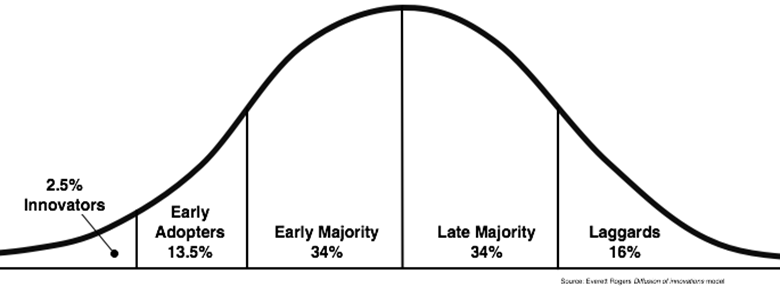Because I am both an avid video game player and a game design major, I am very invested in video games. Thus, I would like to talk about the innovation of video games through the lens of the Diffusion Theory.
The first section in the Diffusion theory is the Pioneers. These are the people who made the first video games back around the mid-to-late 1970s. These early games were either really simple, like Pong, or were entirely text-based with branching paths (branching "choose your own adventure" style games are debatable whether they count as video games). The Early Adopters phase would be around the early 80s, when arcades started to become common. This was still a little bit before and even into the early days when video game consoles could be bought for personal use. By the mid 80s, a lot of families owned video game consoles or regularly went to the arcade to play, starting the Early Majority phase. Video games were still fairly niche and were considered "nerdy" and "just a fad." Well, the nerdy part is still kinda true, but now, video games have certainly proven that they aren't just a fad.
I suppose I would say that around the turn of the century is when the Late Adopters section begins. This is when the people who grew up in the 80s started having their own children and getting games for them and even playing with them. This is the case for me, as I was born in 1998, and my dad got me into video games from an early age. We still play some games together, though I've started playing more single-player games, and he is more and more busy with work and thus doesn't have as much time to play with my brothers and me. Going into the current era, the video game industry is booming, and there are hardly any Laggards who have never and refuse to play video games. Of course, there are still some, such as those who can't afford them or who stick with the belief that they are bad for you.
Overall, I think the invention and innovation of video games is a good thing, but I can see that there are some downsides to them. For one, video games (as well as TV and other electronic media) have contributed to a general lowering of attention span among young people. There is also the argument that staring at screens has negative effects on your health, namely eye damage and possibly mental health. Despite that (though I am biased), I think that video games have more positives than negatives. I think that video games have great artistic value, and they can be used to convey ideas and messages. They are also a good passtime and method of entertainment, and they can be used to make new friends. Not all video games are mindless, either. Some have rich stories and advanced concepts, and some are active and serve as a way to get exercise or improve your reaction time.

Here is the article I got this picture from:
https://sphweb.bumc.bu.edu/otlt/MPH-Modules/SB/BehavioralChangeTheories/BehavioralChangeTheories4.html
No comments:
Post a Comment